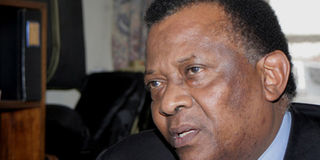LSK appoints Nzamba Kitonga in suit challenging new security laws

Former Committee of Experts (CoE) chairman Nzamba Kitonga. Experts who drafted the Constitution have opposed separate efforts by two MPs to reduce the number of counties, warning that no single person can execute such a process without offending the supreme law. FILE PHOTO | NATION MEDIA GROUP
What you need to know:
- The hearing of the case, filed by the Coalition for Reforms and Development (Cord), continues on Monday in the High Court.
- High Court allowed the consolidation of Cord’s petition with that of Kenya National Commission on Human Rights (KNCHR) on the basis they raised the same issues
The Law Society of Kenya (LSK) has appointed senior counsel Nzamba Kitonga to be enjoined in the suit challenging the recently enacted security laws.
A post from the group indicated that LSK had instructed Mr Kitonga to enjoin the suit “to assist the court in arriving at a just decision".
The hearing of the case, filed by the Coalition for Reforms and Development (Cord), continues on Monday in the High Court.
The case will be heard by Justice George Odunga after his colleague Isaac Lenaola last week declined to grant orders to block the law from being implemented.
Last Wednesday, Justice Lenaola gave the government five days to file its defence to Cord’s petition seeking the suspension of the controversial new laws.
For the second time, Justice Lenaola declined to issue temporary orders stopping the implementation of the antiterrorism laws.
He insisted he must get a response from the government before granting any orders.
Justice Lenaola, however, allowed the consolidation of Cord’s petition with that of the Kenya National Commission on Human Rights (KNCHR) on the basis that they raised the same issues.
EXPRESSED RESERVATIONS
The LSK is among professional bodies that expressed reservations about the amendments before the National Assembly passed the contentious Bill.
The Bill was subsequently assented to by President Uhuru Kenyatta.
LSK had, in a memorandum to Parliament, called for an extensive review of the Bill before its enactment.
LSK Chief Executive Officer Apollo Mboya said that the Security Laws (Amendment) Bill of 2014 should be reconsidered urgently and amended in line with the Constitution.
“The Bill also requires strong input from stakeholders, backed with deep research towards addressing the glaring inherent gaps,” Mr Mboya had said.
He said that Article 238 of the Constitution provides that national security shall be pursued in compliance with the law and with utmost respect for the rule of law, democracy, human rights and fundamental freedoms.
“The Memorandum of Objects and Reasons of the Security Laws (Amendment) Bill 2014 is misleading to the extent that it suggests that the amendments are minor,” Mr Mboya said.
He said that the LSK Council had analysed in-depth the proposed laws before coming up with a memorandum on the Security Laws (Amendment) Bill 2014.
SPECIFIC PROVISIONS
Mr Mboya explained that some specific provisions demonstrated that the Bill had serious ramifications for the enjoyment of certain constitutional rights.
“Some of the grossly affected rights relate to access to justice, freedom of association and information, freedom of association and assembly and the right to privacy,” he said.




